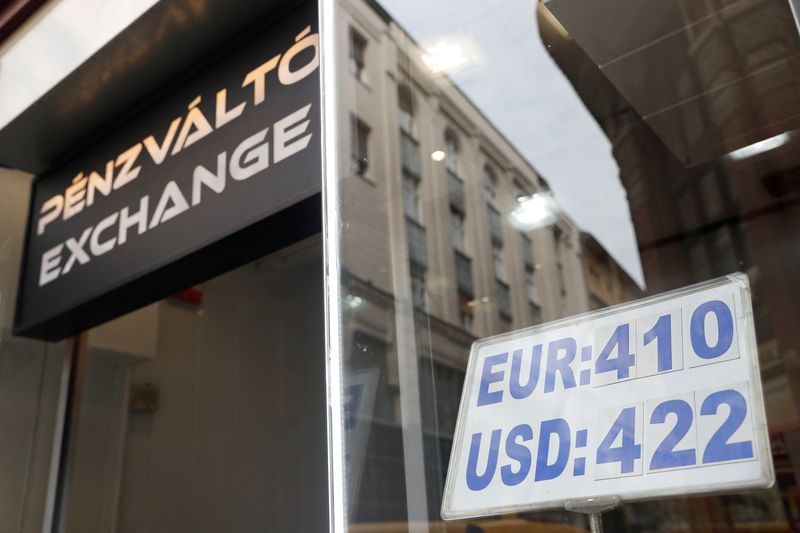By Krisztina Than
BUDAPEST (Reuters) - Hungary's central bank tightened forint liquidity further on Wednesday at a deposit tender as part of its latest efforts to shore up the currency, but too much is stacked against it to provide relief any time soon.
The forint, which hit new all-time lows this week, has become a basket-case among its Central European peers as Hungary's huge energy imports bill, which widened its current account deficit, and a funding row with Brussels makes it especially vulnerable amid sell-off in riskier assets triggered by a surging dollar.
And it could get worse before getting any better for the battered currency as investors are still digesting the central bank's surprise decision to end its rate-hike cycle last month even as inflation topped 20%.
After raising its base rate by 125 basis points to 13% the bank said it would keep tightening monetary conditions by draining liquidity instead, but some analysts called the move premature and were sceptical the new measures could offset the forces weighing down on the forint.
"Rising inflation and a widening trade deficit is unlikely to ease pressure on the HUF in a risk negative global environment," Citigroup (NYSE:C) analyst Eszter Gargyan said in a note.
"Moreover the NBH’s declaration of ending the rate hiking cycle at 13% in September challenges the outlook further."
From October 1, the central bank raised banks' required reserve ratio, launched a new deposit tool and discount bond auctions.
After draining over 2 trillion forints ($4.50 billion) at its deposit tender a week ago, the National Bank of Hungary accepted a further 506 billion forints worth of bids on Wednesday.
"With the long-term deposit tender, the NBH continued to absorb substantial amount of free liquidity and thus to tighten monetary policy," it said in a statement.
JP Morgan however, doubted it would help the forint much without further outright rate hikes.
"The NBH is once again attempting to juggle multiple objectives in our view - delivering some tightening to bring stability to the FX market, while avoiding further outright rate hikes or undue negative growth impact," it said in a note on Tuesday.
"We argue that policy rates need to rise to at least 16-17% to stabilize FX, based on comparable experience of economies with large BoP funding needs."
The forint has fallen 14% to the euro and 36% against the dollar this year, underperforming the Polish zloty and the Czech crown, even with its benchmark rate far above Czech and Polish rates. The zloty has lost 24% of its value to the dollar, while the crown is down 15.8%.
Citigroup's Gargyan said a fall in European gas prices and the sharp decline in domestic demand may help prevent Hungary's trade deficit from deteriorating further in the coming months.
"But it may take some time until the improvement in structural balance, an agreement over EU funds and the liquidity measures provide some relief for the currency," she said.
After a spending spree ahead of April elections, Prime Minister Viktor Orban's government has taken several steps to meet the 4.9% budget deficit target for 2022 and Finance Minister Mihaly Varga on Tuesday pledged more steps if needed to ensure "fiscal discipline".
The government has also passed a raft of anti-graft laws to meet its commitments to Brussels and unlock billions of euros of EU funding, but money is not expected to flow before next year even if a deal is signed this year.
LIMITED TOOLS
In the meantime, the forint remains exposed to negative shifts in global sentiment and prone to weakness, which feeds into domestic prices, further complicating the central bank's efforts to curb inflationary expectations, economists say.
Peter Virovacz at ING in Budapest said the Hungarian market needed a very serious positive message related to a deal on EU funds that could end risk aversion.
Finance Minister Varga asked to comment on the forint on Tuesday said:
"The dollar smashes everything around it."
"Of course we are trying to contribute to a stable currency with disciplined fiscal policy," he added.

"Our tools are limited, this is the world of monetary policy, it is there where the central bank needs to take appropriate measures if it wants to do so."
($1 = 444.71 forints)